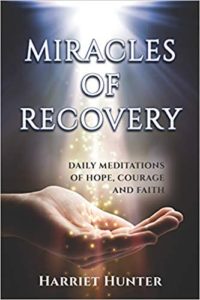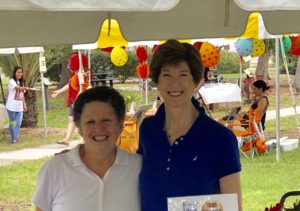 Harriet Hunter has written one of the best daily meditation books I’ve seen in a long time. I just love reading it each morning. Below is an excerpt of the April 21st meditation (p. 123) from Miracles of Recovery: Daily Meditations of Hope, Courage. (Order book Here)
Harriet Hunter has written one of the best daily meditation books I’ve seen in a long time. I just love reading it each morning. Below is an excerpt of the April 21st meditation (p. 123) from Miracles of Recovery: Daily Meditations of Hope, Courage. (Order book Here)
“How many times have we heard others put someone down with, ‘You’re not good enough to do that,’ or ‘You’ll never be able to. . .’? Do these or similar statements resonate within you?
“These are the telltale signs of self-sabotage. “Self-sabotage is the mechanism used to denigrate our power, as if we have none at all. “We become what we think. We need to stop rehearsing our rejections.
“Over time, self-sabotage becomes form fitting, snug in the mis-identification of our self-worth. It feels familiar, safe and warm. We know self-sabotage well because we’ve endured it for a lifetime.
“Somewhere we heard we should promote others while sacrificing ourselves to gain friends and keep the peace. To do so would be to tell ourselves the greatest lie of all: We deserve nothing, but others do. Treating ourselves with the same gentleness and loving care we give to family and others is what we need.
“There is plenty of inner strength and fortitude already deep inside, and we deserve to hear it reflected in our voice.
“So why not let it begin with us? No longer can we allow ourselves to take part in self-deprecating talk. Our voice is listening, waiting for the echo of words that promise love and kindness for who we are.
“When we change the way we see ourselves, we get to change our lives and the way others see us too, with resonating confidence.”
Today’s Meditation
“Today I am conscious of how others speak to me and how it makes me feel. I will not accept negative, demeaning talk from anyone–even me–as I recreate with loving care who I want to be.“
 Harriet Hunter (shown here with me at the Venice FL Book Fair) is the author of the 2018 Miracles of Recovery: Daily Meditations of Hope, Courage. She is a person in long-term recovery, an expert on journaling, and an inspiration to all who know her. Her book is fabulous! Order book HERE Website here FB: Harriet Hunter Author
Harriet Hunter (shown here with me at the Venice FL Book Fair) is the author of the 2018 Miracles of Recovery: Daily Meditations of Hope, Courage. She is a person in long-term recovery, an expert on journaling, and an inspiration to all who know her. Her book is fabulous! Order book HERE Website here FB: Harriet Hunter Author

 Gigi Langer
Gigi Langer